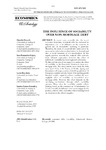The influence of sociability over non-mortgage debt

Use this link to cite
http://hdl.handle.net/2183/24819Collections
- Investigación (FHUM) [116]
Metadata
Show full item recordTitle
The influence of sociability over non-mortgage debtDate
2019-12Citation
Daoudi, D., Fernández-López, S., Rey-Ares, L., & Castro-González, S. (2019). The influence of sociability over non-mortgage debt. Economics and Sociology, 12(4), 313-330. doi:10.14254/2071-789X.2019/12-4/19
Abstract
[Abstract] In recent years, especially after the recent
economic downturn, household debt has increased in
importance, due to its influence on the economy in
general and on households’ wellbeing in particular.
Therefore, the study of household debt turns out to be
necessary in order to know what leads to its demand, and
thus to avoid situations of over-indebtedness. In this
regard, previous research has analysed debt decisions
from different approaches, however, the effect of
individuals’ sociability has been neglected in literature.
To this end, the aim of this paper is to analyse the effect
of sociability on the Europeans’ decision to incur nonmortgage debt. The study sample, taken from the sixth
wave (year 2015) of the Survey of Health, Ageing and
Retirement in Europe, consists of 68,231 people from 18
European countries and also Israel. After applying probit
binomial models, empirical evidence confirms the nonnegligible effect of sociability on households’ nonmortgage debts. However, this effect depends on the
underlying mechanisms through which sociability
operates. Thus, when the sociability variable reflects
learning based on the transmission of information (or
'word of mouth'), its influence over non-mortgage debt is
positive, whereas when sociability reflects learning based
on observation, the effect is negative.
Keywords
Consumer debt
Sociability
Behavioural finance
Europe
SHARE
Sociability
Behavioural finance
Europe
SHARE
Editor version
Rights
Atribución 3.0 España
ISSN
2071-789X






